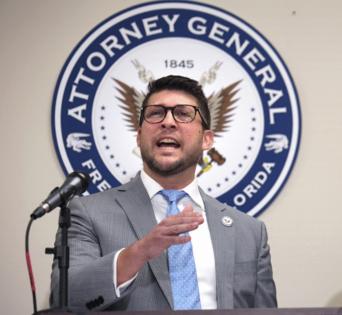Judge who found Florida attorney general in contempt can get tougher if he violates order
Published in News & Features
MIAMI — It seemed inevitable that U.S. District Judge Kathleen Williams would hold state Attorney General James Uthmeier in contempt of court after he violated her order to stop enforcing a new law that makes it a crime for undocumented immigrants to enter Florida.
After all, Uthmeier told state law enforcement agencies that they could arrest migrants who illegally cross into the United States and then arrive in Florida — despite her restraining order issued in mid-April.
In finding Uthmeier in contempt on Tuesday, Williams showed restraint herself, ordering the attorney general to keep her informed of any arrests or detentions of immigrants stemming from enforcement of the state law. As part of his punishment, he must file bi-weekly reports over the next six months.
But what if the attorney general, who still expressed defiance in the aftermath of her civil contempt order, violates it? Can the judge get tougher?
Fines, jail term are options
Legal experts interviewed by the Miami Herald said Williams could fine Uthmeier up to $1,000 or send him to jail for up to six months, or both, as punishment.
“Judge Williams used great restraint in issuing her contempt order,” Miami defense attorney Brian Tannebaum, an expert in ethics law in Florida, said on Wednesday. “But if the attorney general doesn’t abide by her ruling, she could hold another contempt hearing, find him in contempt again, and fine him or send him to jail.”
Miami attorney Andrew Berman, who represents lawyers accused of misconduct by the Florida Bar, agreed with that position.
“If he does something that is classic contempt — such as disobeying or disregarding her order again — she has a whole panoply of remedies, from coercive fines to jail, until he complies with her order,” Berman said.
Uthmeier, 37, is a Florida native who served as chief of staff for Gov. Ron DeSantis before he appointed him as the state’s 39th attorney general in February.
In response to the judge’s contempt finding, Uthmeier struck a defiant position, saying in a post on X: “If being held in contempt is what it costs to defend the rule of law and stand firmly behind President Trump’s agenda on illegal immigration, so be it.”
On Wednesday, it was not clear whether the attorney general planned to appeal the judge’s contempt ruling to the 11th U.S. Circuit Court of Appeals in Atlanta. The appeals court panel already has rejected Uthmeier’s challenge to Williams’ injunction.
His office did not respond to a request for comment.
Uthmeier crossed line, judge said
During the course of his dispute with the judge, Uthmeier seemed at first to be obeying her restraining order when he instructed the Florida Highway Patrol and other police agencies on April 18 that they had to refrain from enforcing the immigration statute. During a hearing that day, Williams learned FHP officers had arrested more than a dozen people for illegally entering the state under the new misdemeanor law, including a U.S. citizen.
But five days later, the attorney general did an about-face in his follow-up letter to the agencies, drawing the judge’s wrath in a lawsuit brought in Miami federal court by an immigration coalition and others challenging the constitutionality of the state law.
Williams said the attorney general crossed the line on April 23 when Uthmeier informed Florida police agencies “there remains no judicial order that properly restrains you from” enforcing the statute.
In light of her contempt ruling, the Miami Herald contacted the Florida Bar to see if it would be investigating Uthmeier for disobeying her restraining order on enforcing the state’s immigration law.
A Bar spokeswoman said “any person can file a complaint regarding a Florida attorney if they believe they have violated the Rules Regulating The Florida Bar.
“However, because Attorney General Uthmeier is a constitutional officer, complaints would have to be filed after he leaves office ... as we do not have jurisdiction while he is in office,” she said.
Tannebaum and Berman, the ethics experts, said a Florida Bar rule stays the statute of limitations on complaints against any lawyers serving as constitutional officers until after they leave their positions.
“Regardless of which side of the political aisle you’re on, it doesn’t make sense for the Florida Bar to be opening investigations while they’re still in office,” Berman said. “The Florida Bar would be inundated with complaints if that were to happen.”
________
©2025 Miami Herald. Visit miamiherald.com. Distributed by Tribune Content Agency, LLC.







Comments